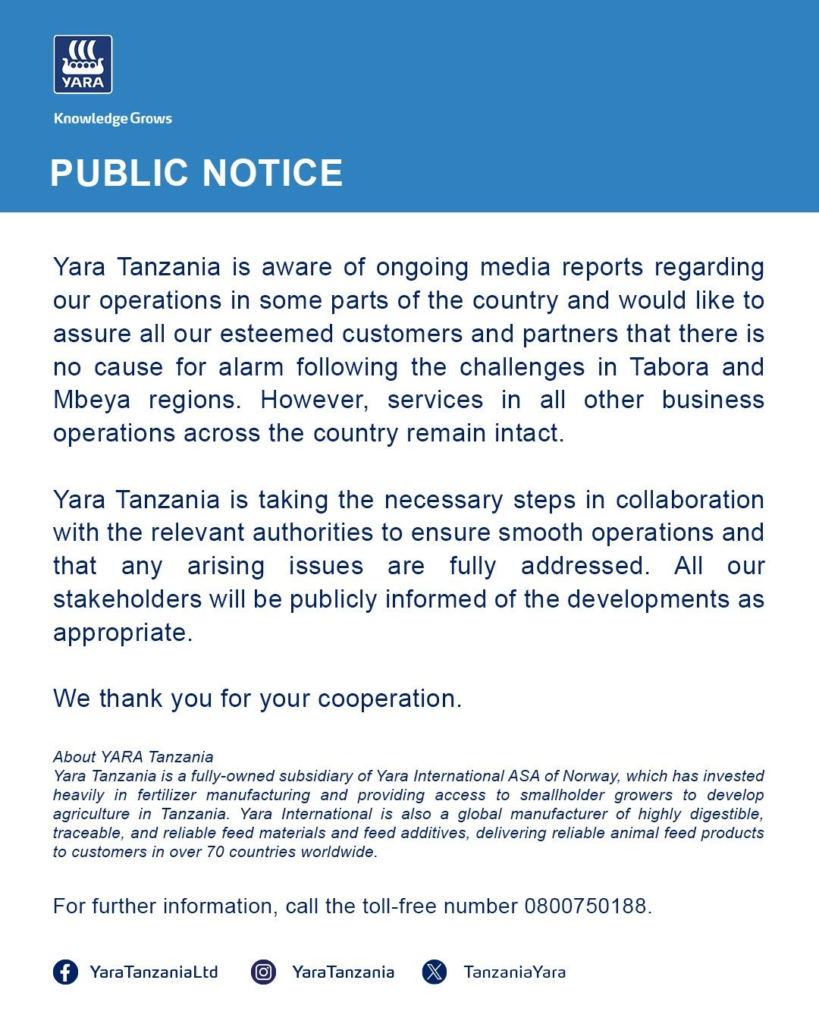In response to recent media reports concerning its operations, Yara Tanzania Ltd, a subsidiary of Yara International ASA of Norway, has issued a public notice to reassure its customers and partners. The company acknowledges challenges in the Tabora and Mbeya regions but assures that its business operations remain robust across the rest of Tanzania.
Yara Tanzania Ltd is actively collaborating with relevant authorities to ensure uninterrupted operations and address any issues that have arisen. The company commits to keeping all stakeholders informed about developments in a timely and transparent manner.
Yara International, known for its significant investment in fertilizer manufacturing and support to smallholder growers, is dedicated to enhancing agriculture in Tanzania. The company’s global presence extends to over 70 countries, where it supplies high-quality animal feed products and feed additives.
Recentky, the Tanzania Fertilizer Regulatory Authority (TFRA) closed down warehouses of Yara Tanzania Ltd in the Tabora region. The closure came after the discovery of the company repackaging expired fertilizer in new bags, falsely indicating it was still fit for use.
TFRA found a total of 16,889 bags, each weighing 5 kilograms, equivalent to 90 tons, valued at 226 million Tanzanian Shillings, in direct violation of the Fertilizer Act No. 9 of 2009.
Joel Laurent, the Executive Director of TFRA, disclosed this information in Dar es Salaam during a press briefing on January 29, 2024. The briefing detailed various operations conducted in collaboration with Regional Security Committees, including those in Tabora.
Director Laurent stated that expired fertilizer should not be repackaged and returned to the market. Consequently, all fertilizer business activities and operations of the company’s warehouse in the Mbeya region have been suspended.
Laurent also mentioned ongoing operations where, in collaboration with security forces in the Songwe region, deceitful practices by some traders in collusion with farmers were uncovered. Farmers registered fictitious farms to sell their fertilizer subsidy identification numbers to agents, violating the subsidy program’s regulations. Those identified in these acts were arrested and subjected to legal proceedings.
Additionally, Laurent reported that as of December 31, the availability of fertilizer was 797,871 tons, which is 89% of the total requirement for the 2023/2024 season, estimated at 848,884 tons. By January 31, 447,603 tons had been sold domestically, leaving a balance of 414,227 tons, more than the required 401,281 tons to complete the season, indicating no anticipated shortage.
Luis Kasela, Chairman of the Subsidy Committee, noted that the digital system in the distribution of subsidized fertilizer has helped control fraudulent activities among some farmers and traders.
However, TFRA continues to issue warnings against any fraudulent activities in the government’s fertilizer subsidy program, asserting that stringent legal actions will be taken against those found guilty.

